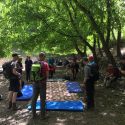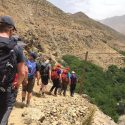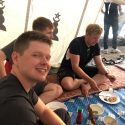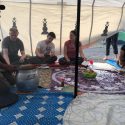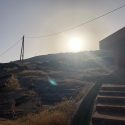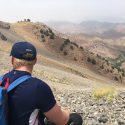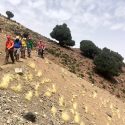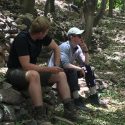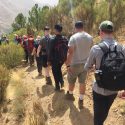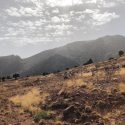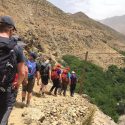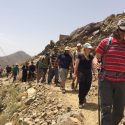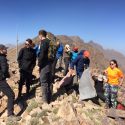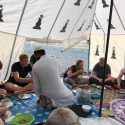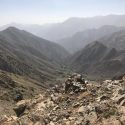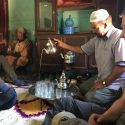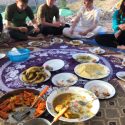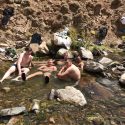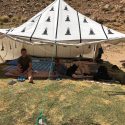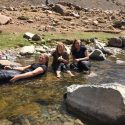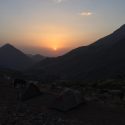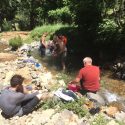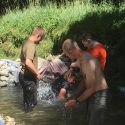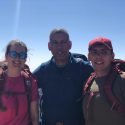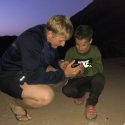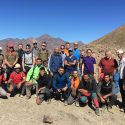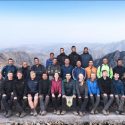The Cambridge University officer Training Corps (CUOTC) recently embarked on a summer mountaineering expedition to the Atlas Mountains in Morocco, led by Officer Cadet McConnell, to complete the objective of summiting Mount Toubkal. EXERCISE DRAGON ATLAS BLUE began on the thirteenth of July, with the members of the expedition meeting at the Army Reserve Centre on Coldhams Lane to be given the initial briefs before setting off. On the fourteenth of July, the group flew out from Gatwick airport to arrive in Marrakech and met Abdullah Baba, the guide who would be seeing us through the mountains. The first night in Imlil the group stayed in a guest house and had their first peek into Moroccan cuisine, as well as trying plenty of Moroccan tea! The next morning the group met the Moroccan Army and Gendarmerie. During this expedition, the overall group got to as large as thirty-one people, including the Moroccan Army and the Gendarmerie. After meeting the Gendarmerie, the group set off on the walking aspect of the expedition.
Day one of the walking allowed for the acclimatisation of the group, getting used to the heat and the sun bearing down. The walking portion of the day was fairly easy, and the group stopped off for a cooked lunch an hour before arriving at the day’s destination. As with each day to follow, the lunch that was provided was freshly cooked by the chefs that were to be following us, and was a full spread of Moroccan cuisine, followed by of course, tea. The next few days were similar in layout, however, lunch was served at the final destinations, rather than during the journey, as the trekking started earlier on in the mornings and we were finished by around lunchtime, allowing for the group to spend the hottest parts of the days covered from the sun. The ten Officer Cadets were paired up before heading out to Morocco, to prepare a short presentation about Morocco. Topics included: Moroccan food and culture, the royal family, and religion. The presentations were given after the final meal of the day, allowing the Cadets to prepare during the day of their presentation.
The next main day of interest was the day the Officer Cadets reached the lake. Two days before the final summit, the Cadets reached a lake which formed a stop point for the group to have lunch and to relax. The group had a four-hour break this day and were able to utilise the shops for cold drinks and chocolates, as well as spend some time in the cool water if they wished to. This lake made a great difference in morale for the people who went in, with the cold water refreshing and reaffirming the magnificence of the expedition. The day after the lake included a 1300m ascent, which was to be the final ascent before tackling Mount Toubkal.
The group summited Mount Toubkal on the twenty-third of July, with the whole group completing the ascent. At the top of the summit, the group took final photographs together and with the Moroccan Army and the Gendarmerie. When arriving back at the refuge that the Cadets were staying at, a final decision had to be made between the Mountain Leaders, as on the previous day, one of the Officer Cadets had rolled their ankle and had struggled on the descent of Toubkal. The decision that was to be made was whether they group should summit the next highest peak, knowing that the climb was perhaps a little bit more technical than the ones they have previously done. The final decision was to not climb the next peak, and to head straight back to Imlil instead.
On the way back to Imlil, there was a storm hit Toubkal, with torrential rain, lightning and thunder. Luckily the group evaded the rain until they had gotten under dry shelter back in Imlil on the twenty-forth. The decision to go straight back to Imlil was perhaps the best decision that could have been made, as that evening of the storm – and the following day – showed reports of multiple hiker deaths around the Toubkal area, as well as the death of fourteen Moroccan’s who had been trapped in a landslide in a minibus. The ultimate decision to not climb on the final day prevented the group from being part of the casualty count. “Even though we couldn’t walk up the final mountain, it shows how much impact one decision can have,” said Officer Cadet Miles, “if we had decided to go, it would have been risky and could have resulted in death as the worst case. It shows the mountains aren’t always the quiet trek that you would think.”
A few challenges that were faced included two of the Officer Cadets struggling during this expedition more than the others. One Cadet contracted diarrhoea, which meant the group was at a slower pace to accommodate the Cadet who was ill. Another Cadet suffered from the altitude throughout the expedition. This once again meant the group were at a slower pace, and the timings for the walking had to be changed to fit around this. For example, on the longer walking days, the group would set off an hour or so earlier, as it meant the group would not be walking during the hotter hours of the day; the group could finish walking at a similar time as planned, but there is consideration for the slower pace.
This expedition allowed for the growth of cohesion within the group, with the group working hard together to achieve the individual day objectives, as well as the final objective of summitting Mount Toubkal. This trip also helped to strengthen international relations with the Moroccan Army and the Gendarmerie, with gifts being exchanged between the groups on the final day in Imlil. The friendships that were made have followed on from the expedition with members of the Moroccan Army and the Officer Cadets uniting on social media to be able to keep in contact. Officer Cadet Harry Bingham said that “the expedition to the Atlas Mountains was a once in a lifetime opportunity for [him]. Without the Officer Training Corps [he] would never have been able to be immersed into the culture quite so much. As someone who had never trekked mountains before, this was an amazing experience and was brilliantly organised!”. Bingham also stated that he “really enjoyed meeting the Berbers and being welcomed into their homes, as well as being looked after by the chefs, mule men, Gendarmerie and the Moroccan Army. To be honest, [he] couldn’t have wished for a better experience.”
The final four days of EX DRAGON ATLAS BLUE consisted of staying at a hotel in Marrakech for our R&R phase. During this phase, Officers and Cadets spent their time relaxing by the pool and sampling the Moroccan Cuisine in a different setting. In between this, the cadets were taken on a tour of Marrakech by horse and carriage. Sightseeing around the city allowed for a different cultural viewpoint from the mountains that the cadets had been in for the past week and a half. This phase was enjoyed and needed by everyone and saw the cadets unwinding before getting on the flight back to the UK.
The trip to Morocco would not have been what it was, without the support of the Ulysses trust and their backing. They provided the much-needed help for us to be able to have mules with us during the trekking phase. This enabled us to stay watered and fed throughout the whole expedition, and they also formed part of our medical plan in case of emergency. Many thanks to the Ulysses Trust for their support on this expedition.

